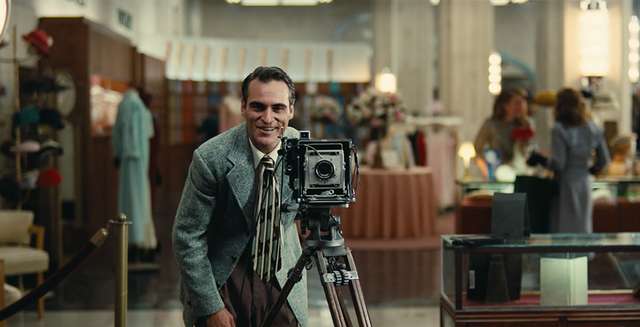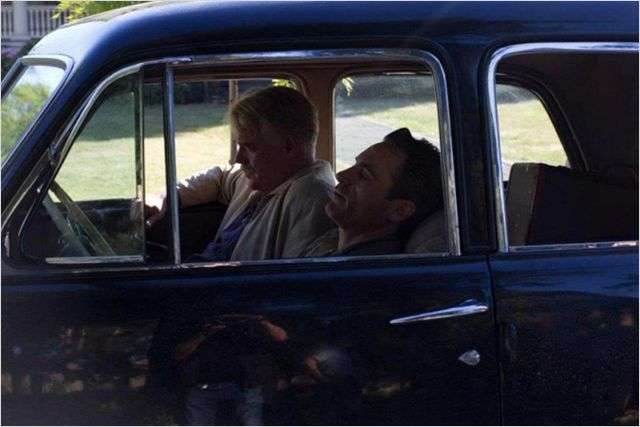Paul Thomas Anderson: THE MASTER (2012)
Two men in a room
Paul Thomas Anderson's The Master is itself masterful, as one would expect from this director. And that means control. Though the two stars, Philip Seymour Hoffman and Joaquin Phoenix, are intense actors playing flamboyant roles, they disappear into them more than you might anticipate -- we know who's in charge of the action. This was shot on film for 70mm projection and that normally means an epic quality, but Anderson by his own choice makes the scale feel intimate. Another qualification: the brilliantly managed cult called The Cause of which Lancaster Dodd (Hoffman), known to followers as The Master, is the founder and leader, clearly refers to L. Ron Hubbard and Scientology, but that's not all Anderson is after. His greater interest is the mysterious bond that develops between Dodd and one Freddie Quell (Phoenix), a crazed World War II Navy vet who served in the Pacific Theater, then by chance becomes the cult leader's boon companion and erstwhile right hand man -- but also remains his most untamable rebel follower. A kind of father-child relationship (so much the topic of There Will Be Blood) springs up between the two men. Dodd cannot tamp down Freddie's animalistic and childlike nature, quell his tendency to sudden violence, or cure his rampant alcoholism. These and his psychosexual abnormalities can't be blamed on the War. Nor is anything resolved for us. But the beauty of Anderson's intractable, impressive film is the compulsively watchable series of intense encounters between the two men. At their best these don't feel quite like the action of any previous film. But one thing was familiar. Watching The Master left me with the same kind of intense reverberating memories I used to carry away from a movie long ago but rarely do any more. It's a P.T. Anderson feeling.
Joaquim Phoenix was considered one of the hardest working actors in Hollywood. Then I'm Still Here and its too convincing promotional campaign made people wonder if he had become unemployable. But maybe when Anderson watched the TV spots and the movie that followed he saw just the quality that he wanted. (He had already used Hoffman four times before.) Anderson obviously likes virtuoso, larger-than-life actors. He also has a gift for casting and like Tarantino for reviving moribund careers. This movie is built around the wayward friend more than the cult leader, because he is the more enigmatic one. Even during the war Freddie Quell acts crazy. Before he meets Lancaster Dodd he gets fired or bombs out of one job after another. The most surprising and visual one, and an opportunity for Anderson to display a veritable cadenza of lush period feel, comes when Freddie, practicing a skill learned in the War, gets to be a portrait photographer at Capwell's Department Store, in Stockton, California. Then he stows away on a boat and is taken in tow by "The Master." Dodd washes brains and creates acolytes. Perhaps Freddie appeals to him because he's such a hard case, a challenge. More than that: he's an ungovernable force of nature. (This performance doesn't remove suspicions that Phoenix is a very strange individual; but his strangeness has been husbanded in the cause of Art.) Dodd also takes things from Freddie. He likes, even seems to deeply crave, the lethal moonshine cocktails Freddie makes laced with paint thinner or with whatever else happens to be at hand. He also likes Freddie's Kools. We may speculate that Dodd admires Freddie's ungovernable wildness, which his followers lack. Maybe he craves it.
The two men's faces dominate the screen in giant closeups and are in strong contrast to each other. Hoffman's is offten reddish, beginning with scenes on the borrowed boat where he would be sunburned. Phoenix's face is not just deeply lined, but even twisted-looking, misshapen; the camera dwells on his lack of symmetry. The strange hunched-over look his upper body has always had now seems to have increased. He frequently plants his hands on his hips and thrusts up his shoulders, as if to hide it, and walks with a back-and-forth swinging gait. No longer remotely handsome, his face seems that of a different person from the actor's earlier days. Freddie's frequent explosions into violence -- and even more often his bursts of spontaneous laughter -- seem all too real. Hoffman on the other hand tones down former theatrical mannerisms. His suave, sympathetic Lancaster Dodd performance is more interesting than it might have been because it goes for charisma rather than caricature. The jokey moments in Dodd's speeches to the converted are a masterful touch: we see through them but also feel the signature charm they would have for devotees.
Anderson films and edits scenes, as did Kubrick, to make them intense and hypnotic, and there's a fine irony in the Master's detractor accusing him of being "a hypnotist." Anderson likes to jump from one sequence to the next without a smooth transition, and he indulges in some dubious sudden flashbacks. But The Master focuses on dialogues and encounters rather than big set pieces. The interrogations and clearing sessions are the only set pieces, their emphasis on simple action, not elaborate mise-en-scene. In one early encounter Dodd asks Freddie repeated short questions, one of his ways of "processing" people. Here it's as if nobody, even the actors, knows what the answers will be. It could be improv or it could be highly rehearsed. In any case Phoenix is riveting. Anderson is brilliantly attentive to the elements of image, sequence, music, acting, but he makes them very much secondary to character here, focusing on an overriding sense of these two men and their impossible, compulsive, and inexplicable grip on each other.
Mind you, there are many complex scenes and excellent secondary roles. Notable among these are Laura Dern, Amy Adams and Rami Malek. "The Cause" is an ensemble, and Anderson has sequences set in the Pacific, in Salinas and Stockton, in Philadelphia, Lynn, Mass., and finally in England. Best not to reveal many specifics about all this. You'll want to see it all for yourself, if you care about movies. Justen Chang of Variety links The Master with There Will Be Blood by saying both have "an unrelenting focus on a borderline sociopath, a deeply scarred individual who craves a certain form of validation, yet proves mentally and emotionally incapable of receiving it from a community whose own motivations are thoroughly suspect." Chang justly praises Jonny Greenwood's delicate, original score, the crisp, lovely cinematography of Mihai Malaimare Jr. and the period accuracy of Mark Bridges' costumes and Jack Fisk and David Crank's set design. Variety's usual nod to the whole collective effort is particularly relevant when a director as brilliant as Anderson and a production as elaborate and beautifully coordinated as this one are involved. There are many other good reviews, mostly raves. I particularly like Anthony Lane's meditative one in The New Yorker, with his emphasis on the mysterious theme of the sea. Meditation is the right mode, because this is a movie to ponder as well as admire.
There were five years between Punch Drunk Love and There Will Be Blood and five more years between that and this, Anderson's sixth film. The Master had a number of surprise 70mm US screenings before it debuted at Venice, where it won joint best actor awards for Phoenix and Hoffman and the best director prize for Anderson, and it showed again at Toronto before a NYC and LA theatrical release Sept. 14, 2012.
[CHRIS KNIPP]






 Reply With Quote
Reply With Quote
Bookmarks